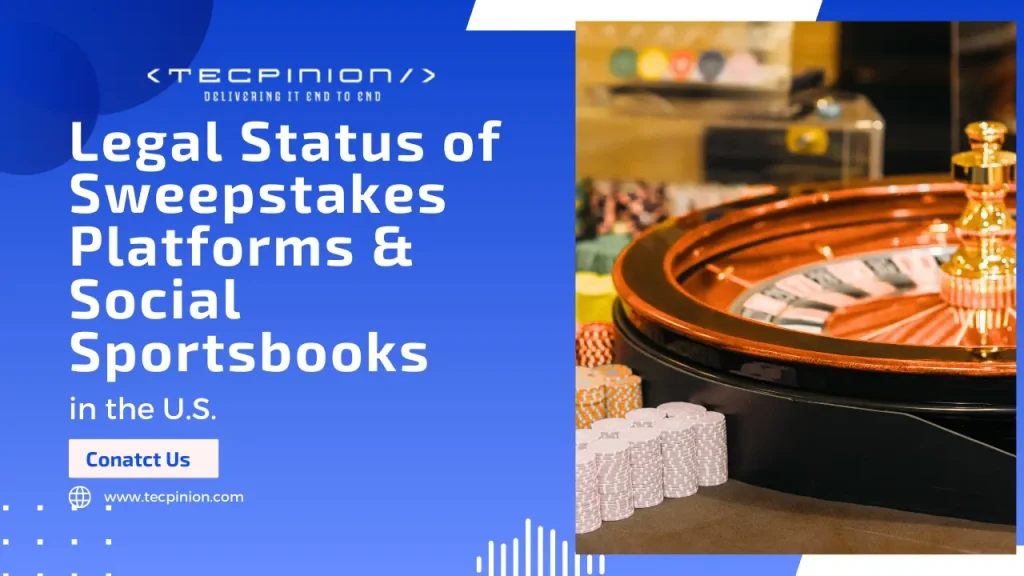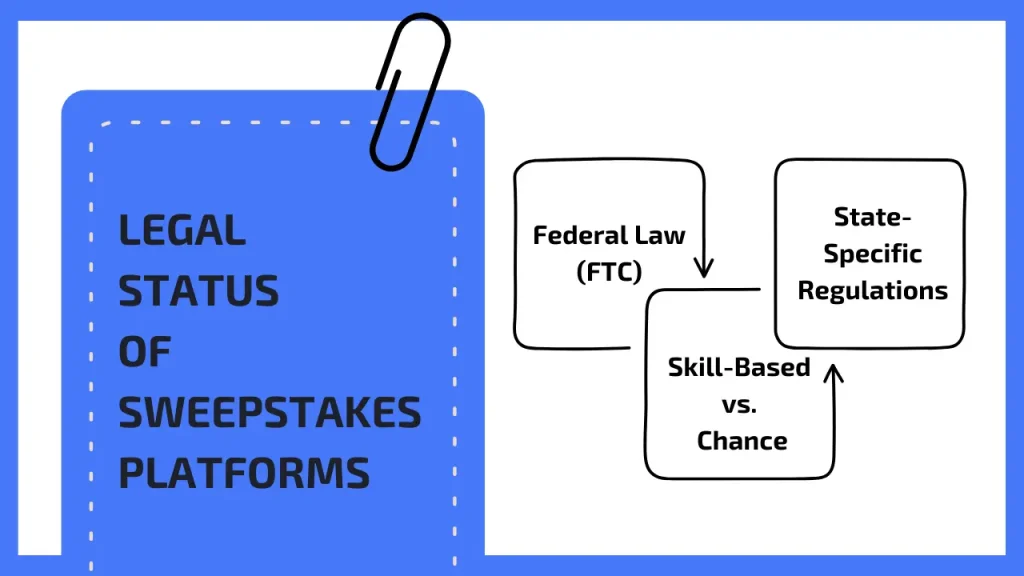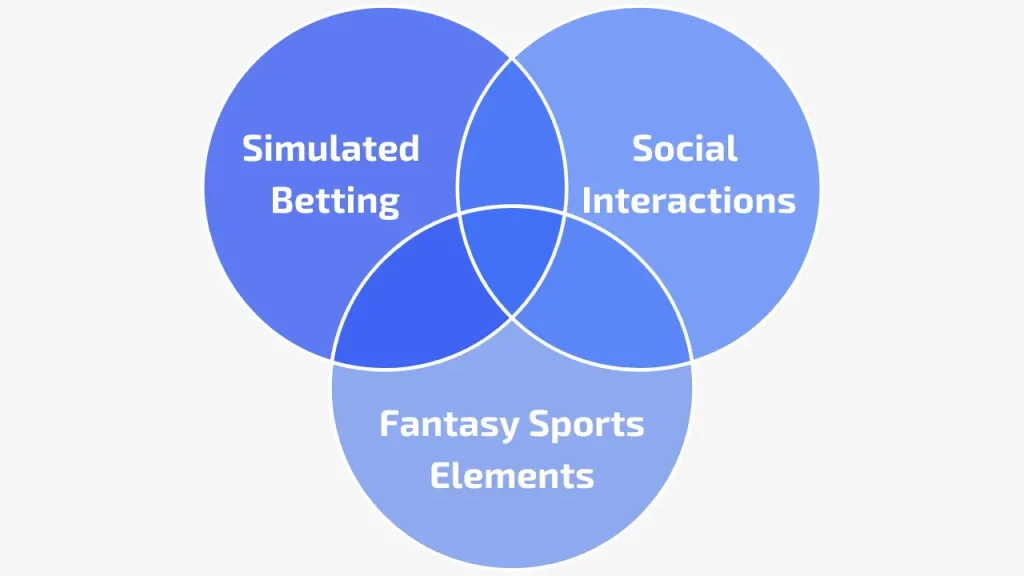Understanding the Legality of Sweepstakes Platforms and Social Sportsbook Apps in the U.S.

Table of Contents
- Introduction: The Rise of Gambling Models in the U.S.
- What Are Sweepstakes Platforms and Social Sportsbook Apps?
- Why U.S. Businesses Are Turning to Sweepstakes and Social Betting Models
- Legal Framework: Federal vs. State Laws in the U.S.
- Licensing, Compliance, and Regulatory Guidelines
- Opportunities and Challenges for B2B Operators
- Top 5 Sweepstakes Platform Providers in the USA
- The Future of Sweepstakes and Social Sportsbook Legality in the U.S.
- Conclusion
- Tecpinion’s Insights: Sweepstakes and Social Sportsbook Platforms
Introduction: The Rise of Gambling Models in the U.S.
In Online gambling, Sweepstakes platforms and social sportsbook apps have become more popular in recent years, providing a blend of entertainment and betting simulations. Sweepstakes are systems where individuals can win prizes after they have entered for free or purchased a product or service. Most of these sites are regulated to prevent them from conducting illegal gambling, and they use prizes and rewards to offer participants incentives to keep playing.
Social sportsbook apps simulate sports betting without using real money. Users place virtual bets with in-app currency, earning rewards or recognition instead of cash prizes. These apps focus on social interaction, allowing users to join leagues, compete with friends, and perform based on skill rather than financial stakes.
Both platforms are rapidly expanding in the online entertainment and gaming industries, integrating casual gaming, social networking, and traditional betting features.
Current market Stats
The Sweepstakes Software Market size is estimated to be USD 350 Million in 2024 and is expected to reach USD 1.2 billion by 2033 at a CAGR of 15.5% from 2026 to 2033.
What Are Sweepstakes Platforms and Social Sportsbook Apps?
- 1. Sweepstakes Platforms
- Sweepstakes platforms host contests where participants win prizes based on chance.
- Entry is often free, though some may allow entries with a purchase.
- Winners are selected randomly, and no skill is required to win.
-
Legal Status of Sweepstakes Platforms

- Federal Law (FTC):
- No purchase necessary to avoid being considered gambling.
- Regulated to prevent deceptive practices.
- State-Specific Regulations:
- Some states have stricter rules (e.g., New York, Florida).
- States may require registration or specific disclosures.
- Skill-Based vs. Chance:
- Games of chance (sweepstakes) are random and require no skill.
- Skill-based games focus on ability and are less regulated.
-
Challenges and Compliance
-
- Avoiding Illegal Gambling:
- No monetary stake is needed to participate.
- Must offer a free entry method.
- Avoiding Illegal Gambling:
- Ensuring “Free to Play”:
- Free entry should be clear and accessible.
- Avoid charging participants to increase their odds.
- 2. Social Sportsbook Apps
Social sportsbook apps let users simulate sports betting without using real money. Instead of real bets, they use virtual currency or points for fun. These apps are mainly for casual play, community interaction, and fantasy sports-style competitions.
-
Key Differences from Real-Money Sportsbooks
- No Real Money Involved: Users wager virtual coins or points rather than actual cash.
- No Cash Payouts: Rewards may include virtual trophies, leaderboard rankings, or non-cash prizes—never real money.
- No Financial Risk: Players can enjoy the thrill of betting without the fear of financial loss.
- Legal Status: Because no monetary exchange occurs, these apps usually fall outside the strict definitions of gambling under U.S. law.
-
Characteristics of Social Sportsbook Apps

- Simulated Betting: Users “bet” on real or simulated sporting events using in-app currency. The odds and game mechanics often resemble real sportsbooks.
- Fantasy Sports Elements: Many applications have aspects similar to fantasy sports, such as selecting teams or players and earning points based on real-world performance.
- Social Interactions: Users can join leagues, challenge friends, compare scores on leaderboards, and share their results on social media, creating a strong community element.
- How Do Social Sportsbook Apps Operate?
-
No Monetary Exchanges
Instead of using real money, users earn or purchase virtual currency (like coins or tokens) to place bets. These coins can't usually be turned back into cash, which helps these sites avoid being called gambling. Some apps give users extra coins for logging in daily, watching ads, or doing tasks in the app.
-
Traditional Casino
Sometimes, players can win sweepstakes-style entries or score in-app rewards such as digital items, badges, or bonus content. These kinds of rewards keep user engagement high, without pushing the company into regulated gambling territory.
-
Social Media and Gamified Experience
Social sportsbook apps often integrate with social media platforms, allowing users to:
1. Share their bets and results with friends
2. Invite others to compete in challenges or leagues
3. Engage in live chats during games
These features make it an interactive and entertaining experience, turning what could be a somewhat lonely experience of betting into a social, gamified event. Others add challenges, level-up systems, or achievements to encourage continued play, like mobile games.
Why U.S. Businesses Are Turning to Sweepstakes and Social Betting Models
As the U.S. gaming landscape evolves, businesses increasingly turn to sweepstakes and social betting models to capitalise on growing consumer interest while navigating complex legal restrictions. With many states still regulating or outlawing traditional Internet gambling, sweepstakes and social betting provide a legal alternative that enables operators to engage consumers through prize-driven games and competitions. Sweepstakes models offer an alternative revenue stream and attract a wider audience, especially younger players drawn to the social and interactive gaming elements. Sweepstakes and social betting systems are also incredibly customizable, allowing businesses to include brand-building features, improve user engagement, and cultivate loyalty through pleasant, skill-based experiences. As more companies seek to expand their reach without overstepping legal boundaries, these models offer a compliant and effective solution to meet regulatory and consumer expectations.
Legal Framework: Federal vs. State Laws in the U.S.

- Federal Law and Social Betting Apps
- 1. The Wire Act of 1961:
-
Overview
The Wire Act prohibits the interstate transmission of sports wagers or bets to prevent organised criminals from running sports betting operations over state lines.
-
Impact on Sportsbook Apps
While originally focused on real-money gambling, its interpretation has been challenged. In 2011, the U.S. Department of Justice (DOJ) clarified that it applies mainly to sports betting and doesn’t affect other forms of online gambling (like poker or casino games) that are legal in certain states.
-
Interstate Sports Betting
The Wire Act still creates barriers for nationwide sports betting apps that involve interstate transactions.
- 2. The Unlawful Internet Gambling Enforcement Act (UIGEA) of 2006:
-
Overview
The UIGEA prevents banking institutions from facilitating transactions related to illegal internet gaming. It does not criminalize online gambling in and of itself, but it does restrict banking transactions associated with illegal gaming.
-
Impact on Sportsbook Apps
It affects apps by making it harder for online sportsbooks to operate nationwide unless they are licensed in states where online betting is legal.
-
Focus on Payment Providers
UIGEA targets payment processors rather than users or operators directly, which can complicate payments for users in states without legal online betting.
- 3. Legal Gray Area: Simulated Betting Apps & Social Casinos:
-
Simulated Betting Apps
Apps that offer virtual betting (no real money involved) but mimic real sports betting activities often exist in a legal gray area. These apps don't technically involve real gambling, but they may resemble it closely enough to trigger regulatory concerns.
-
Social Casinos
These apps offer casino-style games with virtual currency or “coins” but don’t involve actual money wagers. Legal ambiguity arises in terms of whether these apps violate state laws against unlicensed gambling or fall outside of them due to their use of virtual, non-monetary stakes.
- State-by-State Legal Variance
- 1. States That Permit or Regulate Social Sportsbook Apps:
-
Nevada
The pioneer state in legal sports betting, allowing both physical sportsbooks and online apps, including regulated social sports betting apps.
-
New Jersey
New Jersey is known for its extensive sports betting market, including online sports betting apps. New Jersey has a clear framework for mobile sportsbooks.
-
Pennsylvania
Similar to New Jersey, it allows online sports betting and casino apps with regulation in place.
- 2. States with Restrictions on Simulated Gambling or Online Fantasy Sports Apps:
-
Washington
Has some of the strictest online gambling laws and restricts simulated gambling apps that resemble real money betting.
-
Utah
No legal forms of online gambling or simulated betting are allowed.
-
Tennessee
Regulates online sports betting but doesn’t allow social or simulated gambling apps without monetary involvement.
- 3. Trends in Regulation and Future Changes:
-
Legalization of Sports Betting
The Supreme Court's 2018 ruling in Murphy v. NCAA overturned the federal ban on sports betting (PASPA), paving the way for states to regulate sports betting individually.
-
Growing Acceptance
More states are moving toward legalizing sports betting apps, with many now considering or actively passing legislation to regulate social sportsbooks and fantasy sports platforms.
-
Simulated Betting Evolution
The legality of play-for-free and social casinos and other forms of virtual gambling is likely to become clearer and will likely become integrated in some fashion in the overall gambling regulatory scheme as more states legalize real money sports betting.
- Summary of Key Points:
Federal laws like the Wire Act and UIGEA impact interstate sports betting apps, with varying enforcement across states.
State-level regulations play a major role in determining where social sportsbook apps can operate.
Simulated betting apps exist in a legal gray area, often falling under scrutiny depending on whether real money is involved.
The trend is moving toward wider legalisation of sports betting, which may affect how social sportsbooks and gambling apps are regulated in the future.
Licensing, Compliance, and Regulatory Guidelines
Federal Updates on Online Gambling Laws
This part is about recent changes at the federal (national) level regarding online gambling. The federal government can influence state laws by setting certain guidelines or laws, which may force states to either adjust their regulations or enforce new ones. Federal updates could include changes in how online gambling platforms are regulated, how revenue is taxed, or what types of gambling are allowed or banned across the country.
State-Level Efforts to Regulate or Ban Sweepstakes Platforms and Social Sportsbook Apps
States are increasingly eyeing online gambling, including sweepstakes (where users can win prizes from games) and sweepstakes sportsbook apps (which allow users to place virtual bets with no money changing hands). Some states are attempting to crack down on these platforms for, say, fair play, tax revenue, or consumer protection. On the other hand, some states are banning or restricting these platforms to prevent potential harm or to limit gambling exposure.
Opportunities and Challenges for B2B Operators
B2B operators in the sweepstakes and social sportsbook sectors face a unique blend of opportunities and hurdles. With more states restricting traditional online gambling, the demand for alternative, legally compliant models is growing. This opens the door for operators to partner with innovative platforms and expand into new markets. However, the lack of uniform regulation across states creates compliance challenges, requiring legal agility and constant adaptation. B2B providers must also invest in technology, user experience, and responsible gaming frameworks to stay competitive and trustworthy in a rapidly evolving space.
Top 5 Sweepstakes Platform Providers in the USA
As competition grows in gambling and gaming, sweepstakes have become key for staying ahead. Here are the top online sweepstakes software providers in the USA for 2025, offering the features gaming businesses need for engaging and compliant promotions.
1. Tecpinion

2. 1spin4win
1spin4win is an easy-to-use sweepstakes platform that allows small and medium businesses and startups to easily launch and manage promotions with ease. An easy-to-use interface, automation features that include things like auto-entries and winner pickers, make it a popular choice for hosting contests. Supported by social media integration and email notifications, 1spin4win offers a quick and inexpensive way for businesses to increase their audience interaction and promotions, all with a guaranteed return on the next tactic tested.
3. Novomatic

Novomatic specializes in gamified sweepstakes and contests, enhancing user interaction through engaging, game-like entry methods. The platform is designed to boost viral sharing, increasing social media engagement while also promoting brand awareness. Gamified entry methods, social sharing features, leaderboard integrations, and in-depth analytics. Best For Brands and marketing agencies that want to amplify user engagement and drive viral content across social media platforms.
4. High5Casino

High5Casino delivers the best sweepstakes product in its class. The platform is fully compatible with gaming promotions – it is a perfect solution for your gambling business. Real-time gaming integration, secure data management, gaming regulation compliance, and automatic reward service are Key Features. Best If You Want Online casinos, gaming companies, or equipment manufacturers who want to add sweepstakes functionality within their games in a compliant, efficient manner.
5. Play’nGO
Play’nGO offers a versatile and dynamic sweepstakes platform designed for businesses aiming to capture leads and increase brand loyalty. With a focus on ease of use and rapid deployment, Play’nGO helps brands create effective sweepstakes campaigns with minimal effort. Key Features are Customizable templates, social media integration, email marketing tools, and detailed reporting features. Best For E-commerce businesses, marketers, and influencers who want to run effective campaigns to grow email lists, boost social media engagement, and capture leads efficiently.
Would you like to explore more about Sweepstakes Casino Software ?
The Future of Sweepstakes and Social Sportsbook Legality in the U.S.
Potential for Future Legislation
Looking forward, there is a growing call for federal or multi-state frameworks to standardize the regulation of online gaming and social betting platforms. A cohesive legislative approach could help:
- Eliminate the legal uncertainty created by conflicting state laws,
- Protect consumers more effectively through uniform standards,
- Create a more stable environment for operators to grow and innovate.
Conclusion
Sweepstakes platforms and social sportsbook apps occupy a unique and rapidly evolving space in the U.S. gaming ecosystem. While they offer risk-free entertainment and simulate the thrill of betting, their legal status remains complex and state-dependent. Federal laws such as the Wire Act and UIGEA set broad boundaries, but it’s the states that ultimately determine whether these platforms can operate, and under what terms.
For operators, staying compliant means navigating a patchwork of rules, embracing transparency, and adapting quickly to changing legal interpretations. For regulators and lawmakers, the challenge lies in balancing innovation and consumer protection, especially as Sweepstakes platforms continue to grow in popularity and economic impact. As public attitudes toward online gambling shift and digital gaming technologies evolve, the legal framework around sweepstakes and social sportsbook apps will likely continue to transform, requiring ongoing vigilance from all parties involved.
Tecpinion's Insights: Sweepstakes and Social Sportsbook Platforms
Tecpinion can help guide you through this complicated landscape. Our team of professionals delivers personalised advice and planning to help clients remain in compliance with federal and state rules. Whether designing and launching a new sweepstakes platform or social sportsbook app, we provide you need regarding the legal frameworks, transparency best practices, and effective risk management to keep your sweepstakes (or social sportsbook app) running smoothly, all within the parameters of the law. Tecpinion is here to keep you ahead of the pack and backed with the truth!
Tecpinion empowers you to build legally sound, scalable, and engaging sweepstakes and social sportsbook platforms. Our key offerings include:
- Regulatory-compliant platform design
- Integrated legal framework support
- Customizable sweepstakes and sportsbook modules
- Real-time risk monitoring and management
- Built-in transparency and fairness tools
- Scalable and state-ready architecture
- Ongoing compliance advisory and updates
- Secure and auditable reward systems
- Optimized user engagement workflows
- Cross-platform deployment support
Want to know more
about Sweepstakes Casino
read out the related blogs
Recent Post
-
How White Label & Turnkey Solutions Help Start-ups Enter the Gambling Market Faster
-
Top Sweepstakes Sportsbooks of 2026: Social Betting Sites & Platforms
-
Why is the demand growing for flexible iGaming PAM Platforms?
-
What Attracts Online Casino Players in 2026
-
Best 20 Sweepstakes Casino Games Providers of 2026


